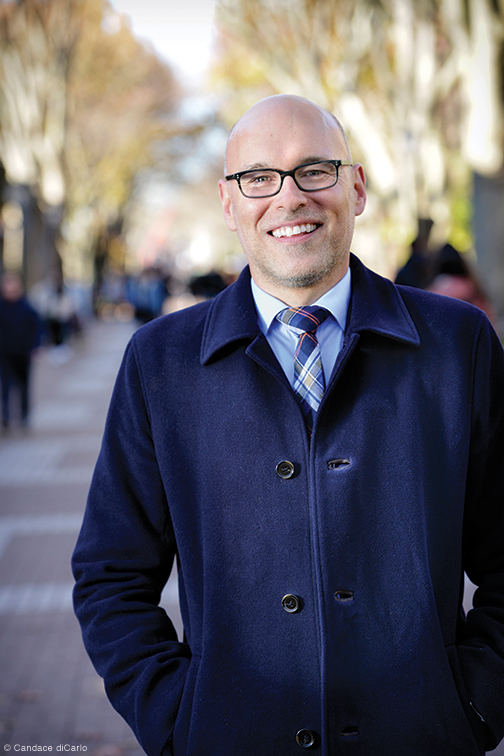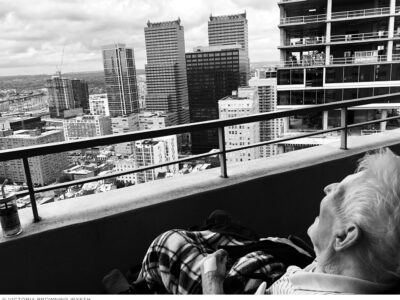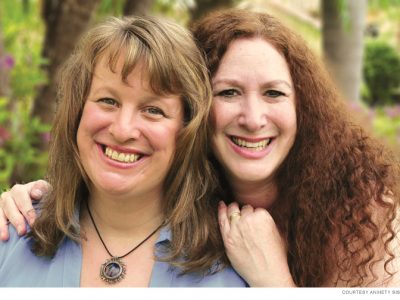
Penn appoints the Ivy League’s first Chief Wellness Officer.
It is easiest to describe wellness by first defining what it is not, says Benoit Dubé GM’01, Penn’s new chief wellness officer and associate vice provost for health and wellness. “Wellness is not just about mental health. It’s a not a checkbox or a competency that you achieve. Wellness is an ongoing process. … And it’s a life skill that we feel our students need to learn before they leave Penn.”
Students today are different than in generations past, he says. They are more connected; they expect things quickly; and they may have unrealistic expectations of themselves.
Hence our approach to student health must also change. That’s why Dubé is here.
President Amy Gutmann announced the University’s Campaign for Wellness in November 2017, following a campus-wide conversation that was held to process a staggering number of student suicides—14 since 2013—and garner ideas about how to foster overall student wellness.
One direct result of that conversation was the hiring of five full-time staff members at Counseling and Psychological Services (CAPS). Another was a broad search to fill a newly created position: chief wellness officer, the first of its kind in the Ivy League.
“We knew we had to find an exceptionally caring, creative, and enterprising leader,” said President Amy Gutmann in an August 28 guest column in the Daily Pennsylvanian. “Dubé fits the need ideally.”
Dubé may be new to this position, but he is not new to Penn.
The French-Canadian psychiatrist with a penchant for novels and airplane trivia has been at Penn since 1997. He was most recently director of wellness initiatives and assistant dean for diversity and inclusion at the Perelman School of Medicine, as well as director of medical student education in the department of psychiatry—to name a few of his 13 previous titles.
“When they offered me this position, my first question was, ‘Well, what percentage of time is this?’ and they just laughed and said, ‘100 percent!’ I thought, ‘Wow, that is like a gift.’ I’ve never had 100 percent to focus on just one thing,” he says.
Although he’s formally tasked with overseeing CAPS, the Student Health Service, and the Office of Alcohol and Other Drug Program Initiatives, Dubé sees his role in three parts: as a listener, a connector, and a broadcaster.
“Listening is really important because I am new to this,” he says. “We are not starting with a blank slate. There are many wonderful programs that exist, and maybe I can use my position as a megaphone to broadcast these resources,” he says.
Dubé learned to listen early on in his training as a psychiatrist. And he knows firsthand about the failings that erupt when no one is listening. As director of wellness initiatives at the Perelman School, he was charged with publicizing the wellness resources available to medical students. So he and his team created Wellness Wednesdays. “We would bring in speakers to talk about nutrition or how to navigate transitions in your career, for example,” he recalls.
“It was an abysmal failure.”
Why? Because he didn’t involve the students in the creation of the programming. “We turned it around very quickly and addressed the students,” he says—asking them to pick the topics, the speakers, even the food.
“The fascinating thing was that about two-thirds of the topics were the same, but the turnout was definitely double, if not more. But because they were invested in it, because they were part of it, it was successful.”
He thinks that may be the most important insight he brings to his new appointment. “Whatever we do as an institution, the students must be part of the solution and not just be given a solution.”
One demand that students have had for a long time is for more clinicians at CAPS. The number of students receiving counseling has almost doubled since 2011, which has significantly increased wait-times for appointments. So, in addition to new hires, Dubé explains, there is now 24/7 access to clinicians via phone.
“Sometimes, if you can talk to a clinician, if you can find support and reassurance in the moment, you may not need to make an appointment for a full assessment and ongoing treatment,” he says.
Another improvement: CAPS is now coming closer to students. Currently, it is a 12-minute walk to get from the Quad to CAPS’s offices at 36th and Market, which may be a barrier for students with busy schedules. While CAPS clinicians have been embedded in the professional schools since 2015, undergrads have always had to make the trek. In a move that will likely spread to other schools, Wharton students now have a CAPS clinician stationed in Huntsman Hall.
Other initiatives include offering a new Pursuit of Happiness course (“an opportunity for us to add an academic valence to our wellness initiatives”); a Student Wellness Advisory Group, or SWAG (“deliberately made up of voices that are often drowned out”); and a crowdsourcing contest for new wellness ideas.
“For example, let’s say you think we should have more water fountains,” he says. “So you go to the website to submit your idea—but along the way, you’re going to see other ideas that you can support. … Then, after the ideas are selected, we’ll have a hackathon. The teams will be made up of students and faculty, or students and staff, to really reinforce that these are shared problems, therefore there must be shared solutions.”
One concern he has heard about again and again on his listening tour involves the stigma that comes with mental health issues. He asks, “Can we find a way to promote wellness that’s more holistic and integrative?”
Part of that may entail having a unified building for all student health services, he muses. “Could we envision a building where there’s one reception area, where the student who has a sore throat and the student who has crippling anxiety can both go to the same place, are received by the same person, and no one knows why they’re there? They’re just there to take care of their health.”
Thinking more broadly, he suggests, “Maybe it shouldn’t be just about receiving treatment. Maybe it could be about promoting health and wellness, with seminar rooms, a meditation garden, a yoga studio.
“And if we push it even more, maybe we can integrate it into the academic mission of this institution. What if we had an academic department also housed in there with a classroom? The Center for Positive Psychology would be a prime candidate.
“The integration can be looked at in many, many different ways,” he says. “We’re not building a new building in the next month, but we’re thinking about it, and we’re allowing ourselves to think big.” —NP




